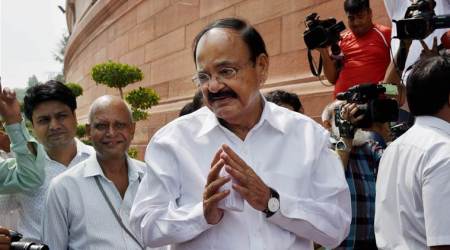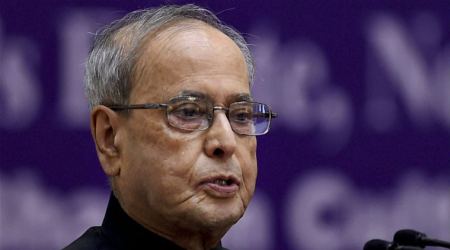 Pranab Mukherjee
Pranab Mukherjee
“Of all sad words of tongue or pen,
The saddest ones are these:
It might have been.”
As Pranabda bows out of Rashtrapati Bhawan, it is a statesman of prime ministerial stature we see moving out of the presidential palace. For, Pranabda has all it takes to make a historic head of government. But Destiny, which, as Omar Khayyam wisely said, “With men for pieces plays/Hither and thither moves/And mates and slays/ Then, one by one, back in the closet lays”. Unless a miracle happens (and they sometimes do in politics) we are never going to see Pranab Mukherjee in Race Course Road. There is the distant example of C. Rajagopalachari, who moved from the Governor-Generalship of India to Government House in Calcutta before becoming Union Home Minister and then Chief Minister of Madras. I once teased the departing Rashtrapatiji with this example but he is a man too embedded in propriety, too strong a believer in what is proper, to even countenance such an idea.
Yet, it is probably the Indian National Congress that is the biggest gainer from this presidential election. For, freed of his constitutional constraints, a retired Pranabda could well become the Congress party’s principal counselor and help guide it back from its present nadir closer to the zenith. Only time will reveal his inclinations in this regard, but the party would do well to listen to his advice (were he to give it) because his has been the wisest voice in the party for decades. We were deprived of it at a time when we were sorely in need of it because the minute he became president his sense of duty detached him from any hint of partisan politics. He was faithful to the only book he knew, which was the Constitution. He studied and restudied it; went into each precedent, many of which he carried in his prodigious memory; conscientiously consulted all he needed to consult; and came to conclusions that were apt and would stand the test of history. He did not depart an iota from his constitutionally decreed role even when it must have been an enormous strain to preside over a nation being led astray from its fundamental values and civilisational attributes.
That is why, at one passing stage, when it looked as if the ruling alliance might fall short of the required majority, a possible consensus candidate to win an uncontested election might have been Pranab Mukherjee himself. Certainly, the Modi government could not have faulted him for any deviation from his oath of office.
In the last three years, there must have been many occasions when the Congressman in Mukherjee must have been crying out to be released from his constitutional bonds, but that unbending adherence to the limits of his constitutional office kept his inward urges under strict control, while his thorough knowledge of the moral authority of his office was fully utilised to air his concerns. He knew the subtle art of hinting at these concerns but stating them in such a manner as to elude those trying to search for a partisan tilt to his remarks. They never found any. For, he indefatigably held to the ethic of constitutional propriety in all his words and actions. Perhaps his moment of departure is also for him a moment of liberation.
It is most unlikely that he will play any overt role in party politics, but Congressmen and women hope, even pray, that they will never be missing a gentle, quiet word from him to the high command to put the party, and, therefore, the nation, on the right path.
What gave Mukherjee his stature in the Congress despite the many storms and setbacks he encountered? The first point to note is that he did not start as a Congressman. His initial party of choice was the Bangla Congress, a regional outfit floated by Ajoy Ghosh after the “Syndicate” was routed by the “Indicate”. But when he was not yet quite 35, Indira Gandhi spotted immense potential in this new recruit to the Rajya Sabha who remained glued to his last-row seat through long hours of debate and discussion when many of his colleagues would find relief in drinking endless cups of coffee in Central Hall. He soon became a permanent fixture at her side, especially after she won the historic “garibi hatao” election of March 1971 with an overwhelming two-thirds majority.
Over the next six years, including the period of the Emergency, Mukherjee spiraled to the top, becoming finance minister when he was barely in his forties. That perhaps was his undoing. For, when Indiraji was assassinated, he was suspected of harbouring excessive ambitions and found himself turfed out of office and even out of the party. He wandered in the political wilderness, even attempting to found his own party — but eventually how he came back and why he had been sent out, or sent himself out, is a mystery that will be unravelled only when he gets to subsequent volumes of his autobiography.
However that may be, by the time Rajiv Gandhi found himself in the Opposition, Pranab Mukherjee had returned — to a humble cubicle in the AICC dealing with economic issues. Once back, however, it took him no time at all to access the inner circle.
Then PV Narasimha Rao became PM, and Mukherjee was well on the way to his second ascent to the top. Appointed Deputy Chairman of the Planning Commission, he was perhaps the last of the chiefs of that now derelict institution to actually believe in planning. A bit like the boy on the burning deck, he held aloft the flag of socialism in a governmental ethos that had lost its faith in the Nehruvian perspective and was reaching out to a brave new world. Several high ministerial offices followed — defence, foreign affairs, finance — and in the party he was always the last repository of principles, policies and politics. Then, at just the moment he might have become PM, he instead became president.
His belief that the Congress is the “natural party of governance” is unwavering. That is just the morale booster we need. Welcome home, Pranabda! The writer is a senior Congress leader and former Union minister

